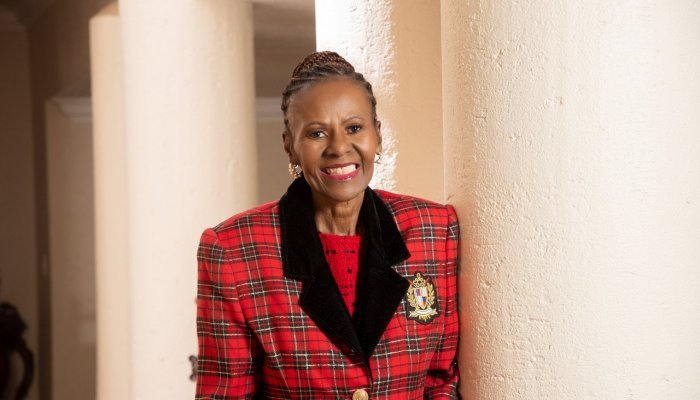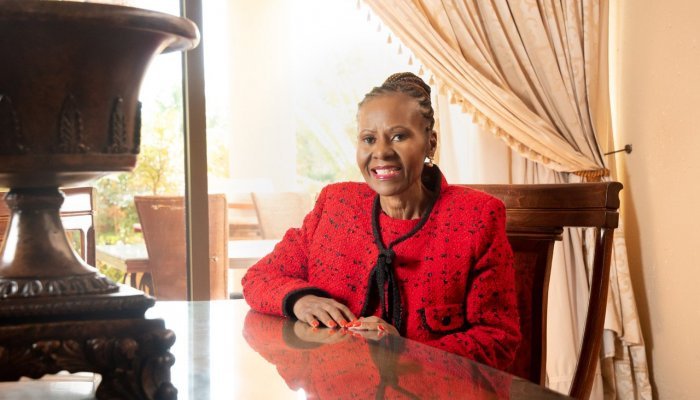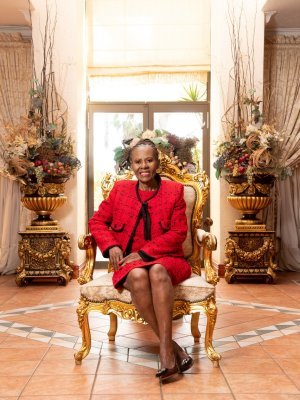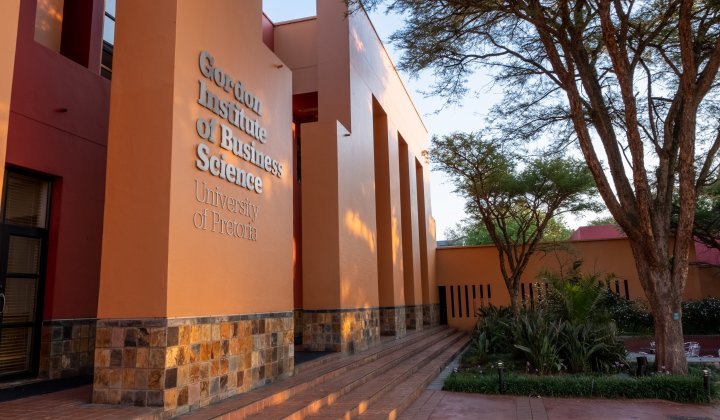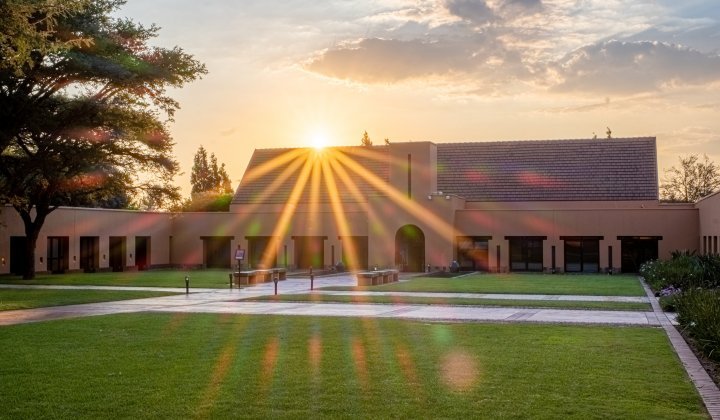Emeritus Constitutional Court Justice Sisi Khampepe is a firm believer in hard work. One of the few female judges to ever be appointed to South Africa’s apex court, she believes the most important thing is to be ambitious.
“Talent without ambition won't make a person go far enough. We do not all have natural talent and abilities, but being ambitious, driven and determined means that a person can reach for the stars. Skills, coupled with a desire to grow, succeed and contribute, leads to success.”
With four decades of service in the legal field, 12 of them as a constitutional court judge, Khampepe was appointed as chancellor of the University of Pretoria from 28 June 2022. She takes over the role from Professor Wiseman Nkuhlu, who has held the position since 2007. She will serve as chancellor for five years with the possibility of being appointed for a further consecutive term.
Her advice for young women embarking on their careers is to maintain their focus: “Remain steadfast in your career. That has been my motto throughout my career: remain steadfast and work hard.”
Resolved to succeed
Born and raised in Soweto as the youngest of three sisters, Khampepe studied law at the University of Zululand, obtaining her degree in 1980. She then completed an LLM at Harvard University in 1982.
While competing on the high school debating team, the idea of pursuing a degree in law became a possibility: “One of our coordinators told me I reminded him of Helen Suzman and said that if I went to university, I should study law like she had.”
However, her initial experience of university was discouraging.
“At my first university lecture, a lecturer walked in and exclaimed there were too many women in the class. He told us that law was not meant for women and that we should rather register at the faculty of social work or education immediately. He warned us that we would fail if we did not follow his advice.”
The experience resolved her to succeed even more: “I remained determined to prove him wrong. And by Jove did I prove him wrong – not only did I pass all my tests, but I was always one of the top in my class.”
After studying, Khampepe went to work at the Legal Resources Centre. During her fellowship programme, she was accepted to do an LLM at Harvard University after being encouraged by the dean of the faculty of law to apply for a scholarship.
However, on her return to South Africa, Khampepe approached several firms to sign articles and was declined by almost all of them. “I wanted to specialise in labour law, and there were not many companies where that was possible.” Finally, with assistance from “none other” than Helen Suzman and Felicia Kentridge from the Legal Resources Centre, she was accepted for articles at Bowman Gilfillan.
Khampepe didn't have a mentor to guide her through her early career: “We were so few then, and the imbalance so conspicuous that you couldn’t have a mentor,” she explains.
In 1983, she opened her own law firm, SV Khampepe Attorneys, specialising in human rights and labour law, and represented trade unions affiliated with NACTU and COSATU. In 1995, she was appointed to the Truth and Reconciliation Commission and became a member of the Amnesty Committee, which was responsible for the granting of amnesty to perpetrators of gross violations of human rights during apartheid.
“There I worked very closely with one of the first black judge presidents of a division of the Gauteng High Court, Judge Bernard Ngoepe. He was instrumental in guiding me and is the person who influenced my ultimate decision to join the judiciary.”
Remaining focused and persistent in pursuit of your goals as your career progresses and distractions accumulate can be a challenge, Khampepe says. “Hard work and nothing but hard work becomes imperative.”
A supportive family structure is also incredibly important mid-career. Khampepe credits her husband for being extremely supportive of her ambitions and her elder sister, who was “pivotal in the creation of my support structure, which becomes invaluable”.
On leadership and the Constitutional Court of South Africa
Khampepe admits to experiencing a rare moment of self-doubt upon her appointment to the Constitutional Court in 2009: “I questioned whether I was properly equipped, and I had fears about my ability to perform optimally at the court. But I remained determined in my intention to succeed because the work of the constitutional court is not about yourself, but about giving meaning to the Constitution.”
The highlight of her career, she says, was her June 2021 judgement against former president Jacob Zuma. As acting chief justice, Khampepe delivered the majority verdict in a contempt of court case, sentencing Zuma to 15 months in prison without the option of an appeal. “My Zuma judgment made sure that the country was put on the straight and narrow of the rule of law.”
Described in tributes as someone with a warm and inviting spirit, Khampepe is known for her laughter and optimistic demeanour. She says her leadership style and philosophy is one of inclusivity, preferring to lead from behind. “I show the way by example and through hard work. For example, when I was acting chief justice, I always invited my fellow colleagues to bring their voices to the fore before making any meaningful decisions. In that way, I created space for everyone to be heard.”
She describes herself as “an unequivocally humble, jovial and honest leader, who sees the person and human being when I look at each and every one of my colleagues. My leadership philosophy is to be approachable.”
Her advice for women who have reached the pinnacle of their careers, which is something she describes as “very close to my heart”, is to support their subordinates: “Once you reach the top, you must create an enabling environment so that more can come after you, for other women to reach the top. You must never make your advancement about yourself. Instead, look out for others who need to climb up as well.”
As a judge, Khampepe strived to use her position and title to help others and to give young, ambitious lawyers opportunities to grow and learn. “That is what mentorship is, and offering yourself as a mentor to others is crucial to succeeding in the field of law.”
During her tenure as chancellor of the University of Pretoria, Khampepe hopes to work with Professor Tawana Kupe, vice-chancellor and principal, to ensure representativity among the university and academic staff.
“When you reach the top, you are prone to negative forces intent on pulling you down,” she adds. “But this should make you more determined. Be humble, resolute and optimistic.”
Chancellor Sisi Khampepe’s career
- 8 January 1957 – Born in Soweto.
- 1980 – Obtained her BProc from the University of Zululand.
- 1982 – Obtained her LLM degree from Harvard Law School, Massachusetts, USA.
- 1981-1983 – Served as a fellow in the Legal Resources Centre.
- 1983 – Joined Bowman Gilfillan Attorneys as a candidate attorney.
- 1985 – Admitted as an attorney and established her own law firm, SV Khampepe Attorneys, which was renowned for defending the rights of workers against unjust laws and unfair employment practices.
- 1995 – Appointed by late president Nelson Mandela as one of the commissioners of the Truth and Reconciliation Commission.
- September 1998 to December 1999 – Employed by the Department of Justice and Constitutional Development as deputy national director of public prosecutions.
- December 2000 – Appointed as a judge of the Gauteng division of the high court and later served as acting deputy judge president of the Labour Appeals Court and Labour Court.
- 2004 – Appointed by former president Thabo Mbeki, together with Emeritus Deputy Chief Justice Dikgang Moseneke, to lead the Judicial Observer Mission during the Zimbabwean elections.
- 2005 - April 2010 – Vice-chairperson of the National Council of Correctional Services.
- 2005 - 2006 – Chaired the Khampepe Commission, an enquiry into the mandate and location of the Directorate of Special Operations (the Scorpions).
- 2006 – Seconded as a member of the Commonwealth Observer Group to the Presidential and Parliamentary Elections in Uganda.
- 2007 – Appointed to the labour appeal court.
- October 2009 – Appointed to South Africa’s constitutional court, where she served for 12 years, twice as the acting deputy chief justice.
- May 2022 – Appointed as chancellor of the University of Pretoria.
- June 2022 – Appointed to head up an independent commission of inquiry into allegations of racism at Stellenbosch University.
Influential figures in Justice Sisi Khampepe’s career:
- Her father, who taught her the value of education: “Whilst we were growing up, my father would repeatedly tell us about the importance of education and how being educated would significantly have a positive impact on our lives.”
- Helen Suzman. Khampepe was inspired to study law after the teacher in charge of her debating team likened her to the politician and anti-apartheid activist. Suzman played a pivotal role in Khampepe’s career when she assisted her in finding a placement for her articles at Bowman Gilfillan in 1983.
- Advocate Felicia Kentridge, who operated the Legal Resources Centre where Khampepe worked as a fellow early on in her career. Kentridge assisted with her placement at Bowman Gilfillan.
- Judge Bernard Ngoepe, South Africa’s first black judge president, who worked with Khampepe at the TRC and the Amnesty Committee and influenced her to enter the judiciary.
- Her elder sister, who was pivotal in the creation of her support structure outside of work.
Khampepe is married and is a mother to a son and a daughter. In the little spare time she has, she enjoys listening to opera.


